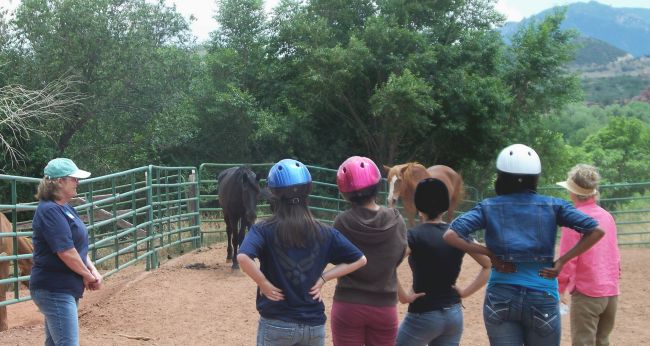| |
 Home Home
|
 About Leg Up About Leg Up
|
 Directors Directors
|
|
 Programs Programs
|
 Commentary Commentary
|
 Photo Gallery Photo Gallery
|
 Press Press
|
 Research Research
|
 EFP EFP
|
|
 Calendar Calendar
|
 Links Links
|
 Contact Us Contact Us
|
| |
|

|
|
|
 |
|
| |
Equine Facilitated Psychotherapy
Equine Facilitated Psychotherapy is an emerging field in which horses are used as partners for emotional growth and learning. EFP is usually a short- term, collaborative effort between a client, therapist, an equine professional, and often an assistant.
EFP is an experiential approach to growth and learning. In the past, experiential therapy and activities have been implemented in ropes courses. Equine Facilitated Psychotherapy adds the dynamic of living creatures, with individual personalities, attitudes, and moods (which sometimes seem as unique as those of their human counterparts). As a result, EAP produces endless experiences and opportunites for discussion, analysis, and learning.No horse experience is necessary for any workshops, seminars, or therapy sessions.
EFP sessions help to:
Build confidence and learn new skills
Improve communication skills
Experience happiness and success
Gain personal insights
Develop new and effective tools to deal with life challenges.
Equine Facilitated Psychotherapy is an effective, experiential and increasingly well-proven way for people to learn about themselves and others. From this work, people experience emotional growth, healing, well-being, success and satisfaction.
Horses, like humans, are social animals that live together in herds with defined hierarchies and roles, very similar to our family systems. Horses trust their instincts, lead and follow authentically, communicate clearly, and are sensitive to and respond appropriately to moods and body language of other horses in the herd. Horses’ survival depends on instinctively spotting any incongruity in their environment. Horses respond to humans in a similar way, therefore, they help clients identify dynamics and issues by mirroring back to them how their actions are being received. Horses quickly help people see both their effective and ineffective ways of being in relationship and communication with others. It is then up to the client to work with the issues or to remove the barriers identified, and cultivate trust and partnership within the relationship.
No previous horse experience is necessary. Participants are taught through supervised grooming, groundwork, bareback riding, herd dynamics, individual and group process.
|
|
|